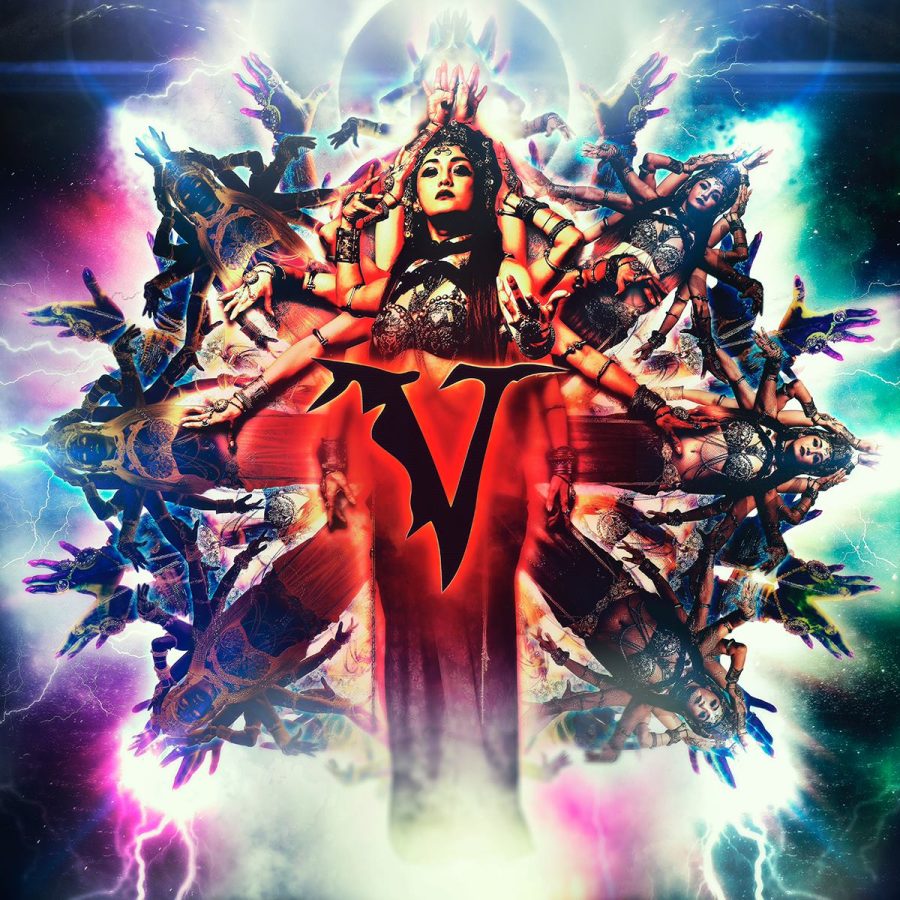Killer Klassix; Veil Of Maya; “Matriarch”
Matriarch” is a masterpiece exhibiting artisans of the craft, using prominent women from anime, comics, and video games not only as the central lyrical theme, but incorporating their character portrayals into the music consistently on each track.
February 27, 2023
(To the women in my life…)
The misconception is women are as strong as the things they can overcome. Growing up, my grandmother, mother, sisters, aunts and, sometimes, cousins invested so much of their lives making sure I was able to make it through my day. Coming from a traditional Latino family, all the women in my life catered to the necessity of the men in their families, often washing clothes, taking care of children (sometimes siblings), and making meals. All this while still juggling jobs and trying to maintain themselves. The work itself totaled to doing enough to match three full-time shifts in a single day, but whether the men valued it was a different story. I watched as the women of my family sacrificed their own happiness to hold together their families. I analyzed everything I witnessed as a child, attuned my personal philosophy and solidified it in my late teens to pay homage to the strength and persistence I witnessed when I was younger, but it was not until the winter of 2017, that I heard an album that further confirmed and solidified my sentiments.
“Matriarch” is the fifth album by Chicago Metalcore band Veil of Maya, marking a new time in the band’s continuity not only in musical style, but in composition as well. The album was released on May 12, 2015 by Metal label Sumerian Records and is to this date, the most controversial album among the band’s fanbase.
The first notable change distinguished by fans and listeners is the inclusion of sung (clean) vocals from new vocalist, Lukas Magyar, former vocalist of the Wisconsin Metalcore band, Arms Of Empire. Up until then, the band achieved underground and notable success with former vocalist and lyricist, Brandon Butler. However, Butler left the band citing “artistic differences,” which materialized into the band’s accessible sound on the album.
“Matriarch” is a masterpiece, using prominent women from anime, comics and video games not only as the central lyrical theme, but incorporating their character portrayals into the music consistently on each track. Every track progresses under a push and pull of sensual guitar micro-melodies, paired and often disrupted by chaotic rhythmic drum grooves that seem out of place on first listen, but after repeated listens are essential to the track’s theme and the album’s accessibility.
“Ellie” is a track based off of the protagonist from the video game (and HBO hit series), “The Last of Us.” Lyrically, the track is self aware of the character’s struggle within the game, not only dealing with monophobia but survivor’s guilt as well. The track is observant of Ellie’s personal struggles while the music materializes her fears of the environment. Using the push and pull structure between melodic and sensual, the (learned) listener is enticed by Magyar’s vocal ability but ensnared by the aggressive nature of Marc Ocubo’s polyrhythmic guitar playing and drummer Sam Applebaum’s dynamic.
“Lucy” is a pivotal part of a trilogy of songs on the album. Lyrically, “Lucy” is tied to the initial track, “Nyu,” who is split halves of the same protagonist/antagonist from the anime and manga of the same name, Elfen Lied, and musically transition into the following track “Mikasa.” The track is an impactful pairing of character narrative and musical exploration. It is composed of common metalcore elements layering aggressive, fast paced rhythms and complimentary riffs with growling vocals. Even though there is so much chaos on the track, Magyar’s lyrics use the character narrative to elevate the track. The highlights of transcendence and oppression can be heard in the lyrics: “Our enforcers have failed/What if failure was always imminent/The future consumes negligence of the past.” Though regarded as pessimistic, Magyar pivots from this sentiment not only to usher in the next character highlight, but to note “they are stitched in the bones of society.”
“Mikasa” was the first single off the album, named after fan-favorite character of the hit anime and manga series “Attack on Titan.” The track is a beautiful musical progression through the alternative subgenres, seamlessly transitioning from punk, to post hardcore, to metalcore in the same track. While thematically pairing the character’s story to the melody of the song, both Magyar and Applebaum establish a dynamic transitioning from sensual to aggressive in the turn of a single guitar riff. Not only is the track appealing, but it also acts as a departure for the track as well as experimenting with popular metalcore rhythms in an attempt for a more accessible sound.
“Aeris” is another video game protagonist from Final Fantasy VII, famous for her heroic contribution to the game and her infamous death scene at the end. The track is the least heavy on the album but still delivers. Using the character’s lore as a catalyst for faith and self-discovery, the track and Magyar flourish, finding footing between putting faith in either humanity or a higher being. The track find balance in both melody and lyrics, progressing under the same uncertainty most do, and finding solid ground somewhere in the middle, as noted by Magyar’s repeated lyrics: “Have faith and you won’t be left behind/Until your guidance is that alone.”
“Three Fifty” is my favorite track. Inspired by Brian K Vaughn’s comic book character from “Y The Last Man,” the track exhibits the narrative of the character from the point of view of another protagonist, Yoric. It is a homage to her courageous commitment to her friend and later romantic interest, Yoric. In avoidance of spoilers, the lyrics are a well-crafted, melodic representation of the book’s main purpose given all the strife one endures throughout life. Magyar’s vocals are layered over one another not only as a symbolic self-contradiction but to exhibit the humanity of self-sacrifice for causes one believes in. Ultimately, Magyar’s closing lines encapsulate not only the essence of the track, but the essence of life itself: “Perception of life is perception of soul/Embrace what’s to come/We may not live eternally/Eternity lies within the unknown/Within the unknown.”
“Phoenix” is another personal favorite and is based on fan favorite “X-Men” character, Jean Grey. Though aggressive and hard-hitting, the track is led by the talents of Applebaum’s motor-esque drum progressions and Magyar’s growling vocals. Centralized on the evil of man, the imagery of Jean Grey’s alter ego acts as a conduit to beautifully portray the destruction man desires. As highlighted by Magyar’s lyrics: “I’ve seen it now, I’ve held it in my hands/My dismembered soul reassembles/Elevation is no escape/We send ourselves, to, search for tranquility/A feeling that can’t be found.” While chaotic and frightening, humanity screams through the message as a warning of the potential inhumanity humans are capable of. Overall, “Phoenix” is one of the more philosophic tracks on the album.
“Danarey’s” is a slowed down, alternative/melodic metal track named after protagonist from the book and television series “Game Of Thrones.” The track is a lyrical romantic ending not only to the character narrative in the story, but it acts as the closing song to the album. Magyar’s vocal range once again shines through, capable of not only deep aggressive growls but also long-held high notes that drive the choral instrumentals to the next verse. Ocubo then harmonizes well with Magyar’s ability to hold notes, continuing to support with micro-melodies that really bring the track to a powerful closing.
These characters may be romantic iterations of examples derived from life, but that in and of itself is a phenomenon that not only displays the strength of women, but their value as well. Whether it is the women who raise our kids, the women who cook our meals, or the women who usher us from one stage of life to the next with no biological tie, they are nonetheless derived from the same situations and stipulations created by the oppressive and stifling patriarchy. However, some women have managed to overcome and defy such constructs in order to become, they themselves “Matriarchs” to provide an example for generations of individuals, not only as role-models to live by, but to pay homage and respect to the thing they have the ability to cradle and create within them.
5/5


















